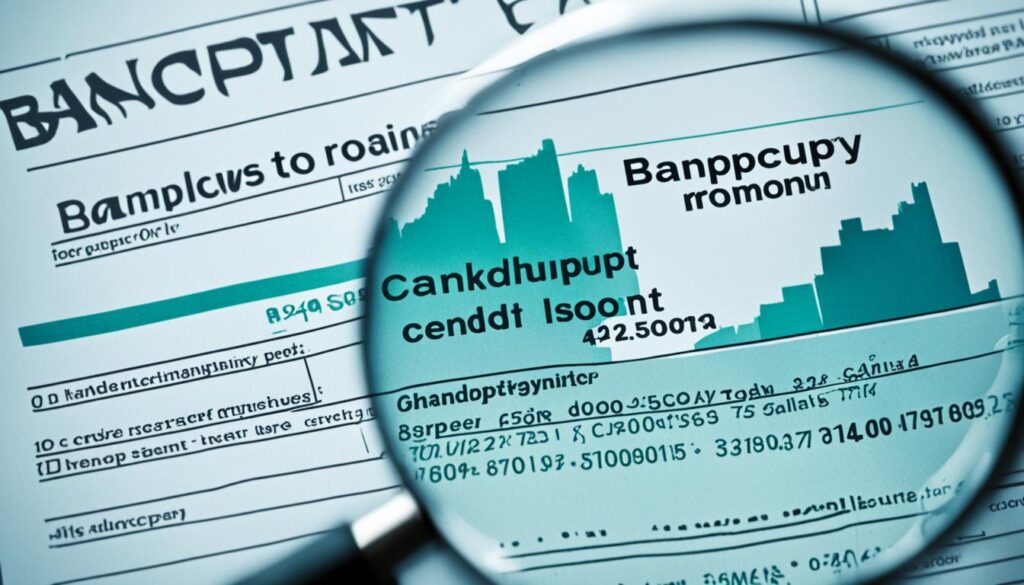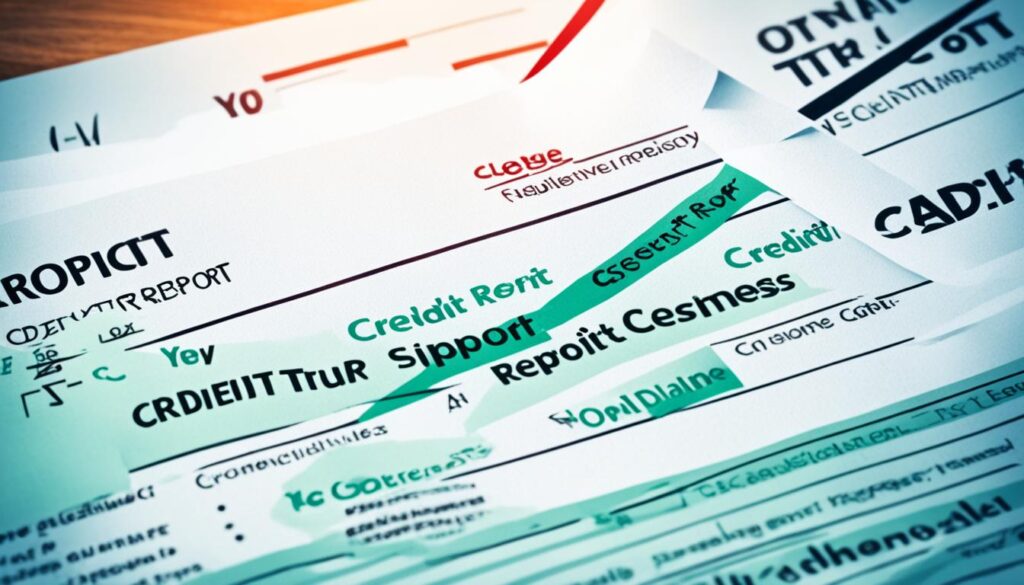Your credit report is vital to your financial life. Lenders use it to decide on loan and credit card applications. Errors on this document can be concerning. Many worry about how disputing these credit report errors might affect their credit scores.
The Fair Credit Reporting Act protects your right to challenge inaccuracies. This law sets rules for credit bureaus and creditors. It’s crucial to understand the effects before starting a dispute.
Let’s examine the pros and cons of disputing your credit report. We’ll discuss potential short-term impacts on your credit score. We’ll also explore the long-term benefits of an accurate credit history.
By the end, you’ll know if disputing your credit report is right for you.
Key Takeaways
- Credit report errors can significantly impact your financial life
- The Fair Credit Reporting Act protects your right to dispute inaccuracies
- Disputing errors may have short-term effects on your credit score
- Accurate credit reports offer long-term financial benefits
- Understanding the dispute process helps you make informed decisions
- Weighing the pros and cons is crucial before initiating a dispute
Understanding Credit Reports and Their Importance
Credit reports are vital to your financial life. They offer a snapshot of your credit history. These documents shape your financial opportunities.
What is a credit report?
A credit report details your credit history. It shows your loans, credit cards, and payment habits. Lenders use it to assess your creditworthiness.
Credit monitoring services help you track changes in your report. They keep you informed about your credit status.
How credit reports affect your financial life
Your credit report impacts many financial aspects. It can influence loan approvals and interest rates. It also affects apartment rentals and credit card applications.
- Secure loans with favorable interest rates
- Rent an apartment
- Get approved for credit cards
- Even land certain jobs
A good credit report creates opportunities. A poor one can limit your financial options.
The role of credit bureaus
Credit bureaus manage your credit information. They collect data about your credit activities. Equifax, Experian, and TransUnion are the major U.S. credit bureaus.
These agencies gather data from various sources. They use lenders and public records to create your report.
Reviewing your credit report is key to debt management. It helps identify errors and track progress. This knowledge empowers you to make smart financial choices.
Common Reasons for Disputing a Credit Report
Credit report errors can hurt your finances. It’s vital to know when to challenge these mistakes. Let’s look at why people often dispute their credit reports.

Wrong personal info is a top reason for disputes. This includes errors in names, addresses, or Social Security numbers. These mistakes can mix up your credit history with others.
Incorrect account statuses are another common issue. You might see late payments when you’ve paid on time. These errors can badly hurt your credit score.
Identity theft often leads to disputes. If you see strange accounts or inquiries, act fast. This protects your credit from further damage.
Outdated info is also worth disputing. Negative items should disappear after seven years. Credit repair often targets these old, harmful marks.
Bankruptcy discharge errors can cause major stress. Make sure your report shows discharged debts correctly. This helps avoid future problems.
| Dispute Reason | Frequency | Impact on Credit Score |
|---|---|---|
| Incorrect Personal Info | Very Common | Low to Medium |
| Wrong Account Status | Common | High |
| Identity Theft | Occasional | Severe |
| Outdated Information | Common | Medium to High |
| Bankruptcy Discharge Errors | Less Common | Severe |
Check your credit report often. This helps you spot issues quickly. Dispute errors right away to keep your credit report accurate.
The Legal Framework: Fair Credit Reporting Act (FCRA)
The Fair Credit Reporting Act protects consumers in credit reporting. It sets rules for how credit bureaus handle your information. The act also outlines your rights as a consumer.
Consumer Rights under FCRA
The FCRA grants you several key rights:
- Access to your credit report for free once a year
- The right to dispute inaccurate information
- The ability to place a security freeze on your credit file
Obligations of Credit Bureaus and Creditors
Credit bureaus must ensure the accuracy of reported information. They must investigate disputes within 30 days and fix any errors. Creditors must provide accurate info to bureaus and respond quickly to investigations.
Time Limits for Dispute Resolution
The FCRA sets strict timelines for resolving disputes:
| Action | Time Limit |
|---|---|
| Credit Bureau Investigation | 30 days |
| Frivolous Dispute Notification | 5 business days |
| Disputed Item Removal | Promptly after verification fails |
Knowing your rights and these timelines helps you manage your credit report. You can ensure its accuracy and fairness.
The FCRA provides a solid framework for fair credit reporting. It helps maintain accurate practices in the industry.
How to Dispute Bankruptcies on Credit Report
Bankruptcy on your credit report can be tough. Knowing how to dispute it is key for credit repair. After a bankruptcy discharge, make sure your credit report is accurate.
Get copies of your credit reports from all three major bureaus. Check them for any mistakes about your bankruptcy. Look for wrong dates, account statuses, or debts that should be gone.

To dispute errors, collect supporting documents like discharge papers and court records. Write a detailed letter to each bureau explaining the mistakes. Include copies of your proof and send by certified mail.
Credit bureaus have 30 days to look into your claim. They must fix any confirmed errors on your report. If problems continue, file a complaint with the Consumer Financial Protection Bureau.
| Step | Action | Timeline |
|---|---|---|
| 1 | Obtain credit reports | 1-2 weeks |
| 2 | Review for errors | 1-3 days |
| 3 | Gather documents | 1-2 weeks |
| 4 | Write dispute letter | 1-2 days |
| 5 | Wait for investigation | 30 days |
True negative info can’t be removed early. Focus on rebuilding credit after bankruptcy. Make timely payments and manage your debts wisely.
The Dispute Process: Step-by-Step Guide
Fixing credit report errors is vital for a healthy financial profile. This guide helps you dispute inaccuracies with credit bureaus. Follow these steps to improve your credit report’s accuracy.
Identifying Errors in Your Credit Report
Review your credit reports from all three major credit bureaus. Look for inaccurate personal information and unfamiliar accounts. Check for incorrect payment histories and outdated negative items.
Gathering Necessary Documentation
Collect evidence to support your dispute. This may include:
- Bank statements
- Payment receipts
- Correspondence with creditors
- Court documents (for resolved legal issues)
Organize your documents to show discrepancies between reported information and actual facts. Clear evidence will strengthen your case for correction.
Submitting a Dispute to Credit Bureaus
File your dispute with each credit bureau reporting the error. You can do this online, by mail, or phone. Explain the issue clearly and include copies of supporting documents.
Credit bureaus must investigate and respond within 30 days. Be patient, as credit repair takes time. If unsuccessful, follow up or seek help from a professional.
Potential Outcomes of Disputing a Credit Report
Credit repair results can vary widely. Your efforts might greatly improve your credit score. They could also lead to minimal changes.

Successful disputes can remove negative items from your report. This often boosts your credit score. For example, removing a late payment can increase your score significantly.
Sometimes, credit bureaus update incorrect information instead of removing it. This ensures report accuracy but may not drastically change your score.
Not all disputes end well. The bureau might keep information they deem accurate. In these cases, your score stays the same.
| Dispute Outcome | Impact on Credit Score | Next Steps |
|---|---|---|
| Item Removed | Potential Increase | Continue monitoring report |
| Information Updated | Slight or No Change | Verify accuracy of update |
| Dispute Rejected | No Change | Consider credit counseling |
Don’t lose hope if your disputes fail. Seek professional debt management help or credit counseling. These services can offer long-term credit improvement strategies.
Does Disputing Hurt Your Credit Score?
Disputing items on your credit report can affect your credit score. Let’s explore how this process impacts your financial health.
Short-term effects on credit score
Disputing an item might cause a small, temporary dip in your credit score. This occurs because the disputed information is marked “under review”.
Credit repair experts say this decrease is usually minor and brief. During disputes, lenders may see a flag on your report.
This could briefly affect new credit applications. Regular credit monitoring helps track changes and plan ahead.
Long-term benefits of accurate credit reports
The long-term benefits of disputing inaccurate information outweigh any short-term setbacks. An accurate credit report can lead to better outcomes.
- Better loan terms
- Lower interest rates
- Improved debt management options
- Higher chances of credit approval
Addressing errors shows you’re taking charge of your financial future. This proactive approach can boost your creditworthiness over time.
A healthy credit score opens doors to better financial opportunities. It also makes debt management easier.
Pros and Cons of Disputing Your Credit Report
Disputing your credit report can transform your credit repair efforts. It’s a powerful tool to fix errors and protect your rights. By challenging inaccuracies, you might boost your credit score and unlock better financial options.
Disputing can improve debt management. Removing errors makes your credit report more accurate. This can help you get better interest rates, saving you money long-term.
However, disputing takes time and effort. You’ll need to gather documents and write letters. You’ll also need to follow up with credit bureaus.
There’s no guarantee every dispute will be resolved favorably. Sometimes, the process might temporarily lower your credit score during investigation.
Consider these factors carefully. If you find real errors, disputing is often worth it. It’s your right to have an accurate credit report. Be ready for the work and understand results may vary.

